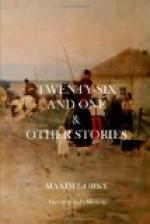The other, bending his long, lean body forward, like a bird poising for flight, gazed ahead into the darkness with his hawk’s eyes. Turning his fierce, aquiline nose from side to side, he held the tiller with one hand and with the other tugged at his moustache which by a constant trembling betrayed the quiet smile on the thin lips. Tchelkache was pleased with his success, with himself and with this lad, whom he had terrified into becoming his slave. He enjoyed in advance to-morrow’s feast and now he rejoiced in his strength and the subjection of this young, untried boy. He saw him toil; he took pity on him and tried to encourage him.
“Hey! Say there!” he asked softly. “Were you very much afraid?”
“It doesn’t matter!” sighed Gavrilo, coughing.
“You needn’t keep on rowing so hard. It’s ended, now. There’s only one more bad place to pass. . . Rest yourself.”
Gavrilo stopped docilely, wiped the perspiration from his face with the sleeve of his blouse and again dipped the oars in the water.
“That’s right, row more gently. So that the water tells no tales. There’s a channel to cross. Softly, softly. Here, brother, are serious people. They are quite capable of amusing themselves with a gun, They could raise a fine lump on your forehead before you’d have time to cry out.”
The boat glided over the water almost without sound. Blue drops fell from the oars and when they touched the sea there flamed up for an instant a little blue spot. The night was growing darker and more silent. The sky no longer resembled a rough sea; the clouds extended over its surface, forming a thick, even curtain, hanging motionless above the ocean. The sea was calmer and blacker, its warm and salty odor was stronger and it did not appear as vast as before.
“Oh! if it would only rain!” murmured Tchelkache; “we would be hidden by a curtain.”
On the right and left of the boat, the motionless, melancholy, black hulls of ships emerged from the equally black water. A light moved to and fro on one; someone was walking with a lantern. The sea, caressing their sides, seemed to dully implore them while they responded by a cold, rumbling echo, as though they were disputing and refusing to yield.
“The custom-house,” whispered Tchelkache.
From the moment that he had ordered Gavrilo to row slowly, the lad had again experienced a feeling of feverish expectation. He leaned forward, toward the darkness and it seemed to him that he was growing larger; his bones and veins stretched painfully; his head, filled with one thought, ached; the skin on his back shivered and in his legs were pricking sensations as though small sharp, cold needles were being thrust into them. His eyes smarted from having gazed too long into the darkness out of which he expected to see someone rise up and cry out: “Stop thieves!”
When Tchelkache murmured: “the custom-house!” Gavrilo started: he was consumed by a sharp, burning thought; his nerves were wrought up to the highest pitch; he wanted to cry out, to call for help, he had already opened his mouth and straightened himself up on the seat. He thrust forward his chest, drew a long breath, and again opened his mouth; but suddenly, overcome by sharp fear, he closed his eyes and fell from his seat.




